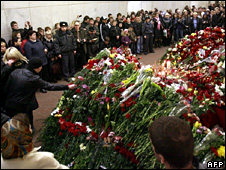 At least 12 people, including a top local police official, have been killed by two suicide bombings in Russia's North Caucasus republic of Dagestan.
At least 12 people, including a top local police official, have been killed by two suicide bombings in Russia's North Caucasus republic of Dagestan.A car bomb was detonated at about 0830 (0430 GMT) outside the offices of the local interior ministry and the FSB security agency in the town of Kizlyar.
Another bomber then blew himself up 20 minutes later as a crowd gathered.
Russia is on alert after double suicide bombings on the Moscow Metro on Monday morning, which left 39 people dead.
Prime Minister Vladimir Putin has called on the security forces to "scrape from the sewers" those responsible for the Moscow attacks. Investigators say they believe the bombers were linked to militants in the North Caucasus.
At a government meeting following Wednesday's bombings in Dagestan, Mr Putin condemned the "terrorist act" and said he did "not rule out that it is one and the same gang at work".
The BBC's Richard Galpin in Moscow says that although no-one has yet claimed responsibility for either of the attacks, both bear the hallmarks of previous suicide bombings carried out by Islamist militants from the restive region.
Last month, Chechen rebel leader Doku Umarov warned that his fighters' "zone of military operations will be extended to the territory of Russia... the war is coming to their cities".
'Cancerous tumour'
In Wednesday's attacks, the first suicide bomber detonated his explosives when police tried to stop his car as he drove into the centre of Kizlyar, Dagestani Interior Minister Rashid Nurgaliyev said.
"Traffic police followed the car and almost caught up - at that time the blast hit," he told local television.
As police, emergency services personnel and residents gathered at the scene, a suicide bomber wearing a police uniform approached and blew himself up, killing among others the town's chief of police, Col Vitaly Vedernikov, Mr Nurgaliyev added.
Mobile phone video footage posted on the internet afterwards showed the moment of the second blast, with officials walking past a damaged building before a loud bang rings out and smoke rises in the distance.
A total of nine police officers were among the dead, the investigative committee of Russian prosecutors said in a statement. Twenty-three people were injured.
Kizlyar is close to Dagestan's border with Chechnya, where Russian forces have fought two wars against separatists since 1994 that claimed more than 100,000 lives and left the republic in ruins.
Chechnya has in recent years been more peaceful, but the fighting has spread to Dagestan and Ingushetia, where a violent Islamist insurgency is growing.
Correspondents say poverty, unemployment and the brutal tactics of the security forces have been factors in driving young men into the ranks of Islamist rebel groups, which want to drive the Russians out.
President Dmitry Medvedev recently said separatists had spread through the North Caucasus "like a cancerous tumour" and earlier this year appointed a deputy prime minister to oversee the troubled region.
After Wednesday's attacks, Mr Nurgaliyev ordered police to increase security at official buildings across Dagestan, as well as at places where crowds gather, including schools, colleges and cinemas.
"These attacks show that terrorists can target anywhere," he said.
Mourning
On Tuesday, Russians observed a day of mourning for those killed the suicide bombings on Moscow's Metro, carried out by two women said to have links to the North Caucasus.
The first bomb tore through a carriage of a train at Lubyanka station - beneath the headquarters of the Federal Security Service (FSB) - as it stood waiting for commuters during the morning rush hour.
The second explosion, six stops away at Park Kultury, was about 40 minutes later. It hit the back of the train as people were getting on.
The devices - believed to have been made with the powerful explosive hexogen, also known as RDX - were filled with chipped iron rods and screws for shrapnel.
The co-ordinated attacks were the deadliest in Moscow since February 2004, when 40 people were killed by a bomb on a packed metro train as it approached the Paveletskaya station.
Prime Minister Putin has said investigators should view catching the organisers of Monday's bombings as a "matter of honour".
Russian media reports are linking them to the death earlier this month of a rebel leader from Ingushetia - Alexander Tikhomirov, also known as Said Buryatskiy - who was blamed for an attack on a train from Moscow to St Petersburg last year that killed 26 people.
The newspaper Kommersant quoted security sources as saying they believed Tikhomirov had recruited 30 potential suicide attackers, and that two of them might have avenged his death.
The funerals for several of the victims, which were due to take place in Moscow later on Wednesday, have been postponed for a day.
Send your pictures to yourpics@bbc.co.uk or text them to +44 7725 100 100 . If you have a large file you can upload here.
Read the terms and conditions



